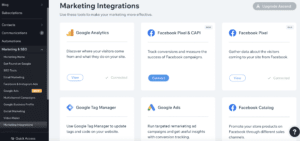In today’s digital age, it’s no secret that search engine optimization (SEO) plays a pivotal role in the success of businesses, including medical practices in the field of holistic medicine. As a functional medicine doctor running a private practice, you’re likely aware of the importance of having a strong online presence. However, understanding how much you should invest in local SEO services can be a daunting task, especially with the myriad of options available.
In this comprehensive guide, we’ll delve into the world of local SEO for holistic medicine practitioners and answer the burning question: “How much should I pay for local SEO?” We’ll explore the key factors that influence the cost of local SEO services, the value they bring to your practice, and why it’s crucial to view local SEO as an integral part of your overall SEO strategy. So, let’s dive in and demystify the world of local SEO pricing.
The Significance of Local SEO
Local SEO is like a puzzle piece that perfectly fits into the larger picture of your overall SEO strategy. It’s essential to recognize that local SEO doesn’t operate in isolation but is intricately connected to your broader SEO efforts. While optimizing your website for search engines is undoubtedly crucial, local SEO takes it a step further by honing in on location-specific searches. It ensures that potential patients in your area can easily find you when they’re seeking holistic healthcare services. So, think of local SEO as the neighborhood map guiding patients straight to your doorstep within the vast landscape of the digital world. It’s a vital component that complements your comprehensive SEO strategy, helping you connect with the right audience effectively.
Local SEO in the Healthcare Industry
Local SEO holds a unique significance in the healthcare industry due to its nature. Most healthcare professionals, whether they are physicians, pediatricians, speech-language pathologists, psychiatrists, chiropractors, or others, primarily serve patients within a specific geographic area. Unlike some businesses that can cater to a global audience, healthcare providers rely heavily on attracting patients from their immediate vicinity. This localized approach makes local SEO an indispensable tool for healthcare practitioners. It ensures that when someone in your community searches for healthcare services, your practice appears prominently in their search results. In essence, local SEO enables you to tap into the pool of potential patients within your neighborhood, establishing your practice as the go-to healthcare destination in your local area. It’s a strategic advantage that’s tailor-made for healthcare professionals looking to grow their practices and serve their communities effectively.
Local SEO in the Holistic Medicine Niche Specifically
When it comes to the holistic medicine niche, the importance of local SEO takes on an even more profound role. Holistic practitioners often have a unique approach to healthcare, focusing on whole-body wellness and personalized treatment plans. This approach attracts individuals who are not only seeking medical expertise but also a deeper connection with their healthcare providers.
Local SEO becomes a potent tool in this context. It allows holistic medicine practitioners to connect with individuals who share their values and are actively seeking holistic healthcare options within their local community. Whether you’re a functional medicine doctor, acupuncturist, herbalist, or any other holistic practitioner, local SEO can help you stand out in a crowded field.
People interested in holistic medicine often place a high value on trust, expertise, and a strong doctor-patient relationship. Local SEO ensures that your practice appears prominently in local search results when individuals search for holistic healthcare services. This visibility not only helps you attract more patients but also establishes trust, as potential patients see that your practice is conveniently located nearby.
Furthermore, local SEO strategies can highlight your holistic approach, emphasizing your commitment to personalized care and holistic wellness. By optimizing your online presence for local searches, you can effectively communicate your unique value proposition and connect with individuals who resonate with your holistic healthcare philosophy. In essence, local SEO in the holistic medicine niche is about bringing like-minded patients to your doorstep, fostering a deeper connection, and ultimately helping you grow your practice while staying true to your holistic principles.
Is Local SEO Expensive: The Range of Local SEO Costs
Now that we understand the significance of local SEO, let’s delve into a critical aspect of it: the range of local SEO costs. As a small business owner in the healthcare industry, you’re undoubtedly invested in growing your practice and attracting patients who align with your approach to the practice of medicine. While it’s tempting to seek out the most budget-friendly local SEO options, it’s essential to recognize that quality and expertise come at a cost. In this section, we’ll explore the various factors that influence local SEO pricing, helping you gain clarity on what to expect when investing in this crucial aspect of your online presence. So, let’s unravel the intricacies of local SEO costs and find the best approach to enhance your practice’s visibility within your community.
The Danger of Cheap SEO Services
In the world of SEO, you might come across enticing offers for cheap SEO services that promise quick results at a bargain price. While the idea of saving money is appealing, it’s essential to approach these offers with caution, especially when considering local SEO for your holistic medicine practice. Cheap SEO services often come with a significant downside – they’re usually too good to be true.

List Management Services: Too Good to Be True?
One common type of low-cost SEO service is list management. These services typically charge a minimal monthly fee, often around $50, to ensure your business listings across various online directories are accurate and consistent. While this might seem like a convenient and affordable way to improve your online presence, it’s essential to recognize the limitations of list management services, especially for healthcare professionals like holistic medicine practitioners.
A couple of years ago SEO companies were marketing these so effectively that even I fell for it. Was I missing something? Could I truly get results for our clients that were just as good just by doing this? I talked to a bunch of third-party providers and they had me sold. So, we signed up for one and tested it. And I was seriously disappointed. So, we tried another. And another.
I learned an important lesson. First, list management services alone aren’t true “Local SEO.” That’s one component of SEO. Second, that alone is nowhere near enough to get you ranking well. I knew that. I was just confused by all the great salesmanship.
So, list management services or pure “Local SEO” packages aren’t bad. They’re just not effective on their own.
The Pitfalls of Cheap SEO Packages
The allure of a cheap monthly fee for SEO services can be tempting. After all, who wouldn’t want to boost their online visibility without breaking the bank? However, it’s crucial to understand the potential pitfalls of bargain-basement SEO. Many of these services lack the expertise and industry-specific knowledge needed to deliver meaningful results for healthcare professionals. When it comes to holistic medicine and the healthcare industry in general, a one-size-fits-all approach simply doesn’t work.
Bargain-basement SEO packages often aren’t doing enough to really get you results. Or, worse yet, occasionally they’re doing shady, unethical things that violate Google’s guidelines. In these more rare instances, you may temporarily get good results but then we’ve seen people end up with manual penalties or just big drops with Google’s next algorithm change. So, even if you do see some initial results they don’t last.
Unfortunately, investing in ineffective SEO services can be costly in more ways than one. Not only are you spending money on a service that doesn’t deliver the desired outcomes, but you’re also wasting valuable time that could be better spent on your patients and growing your practice. It’s frustrating to realize that the inexpensive SEO service you chose isn’t making a significant impact on your online visibility or patient acquisition.
Investing in Holistic SEO: A Smart Move
So, what’s the alternative? For holistic medicine practitioners, investing in holistic SEO is a smart move. Holistic SEO goes beyond list management and takes a comprehensive approach to boost your online presence, engage your target audience, and drive more patients to your practice. While it might come at a higher price point than cheap SEO services, the value it provides in terms of genuine results and long-term success is immeasurable.
Understanding the Value of Comprehensive SEO
Comprehensive SEO services encompass various aspects of online marketing, including optimizing your website for search engines, creating high-quality content, and implementing local SEO strategies. These services are tailored to your specific niche, ensuring that your practice stands out in a crowded digital landscape. While the initial investment may be higher, the returns in terms of increased patient inquiries and practice growth are well worth it.
The Holistic Approach: Blending Local SEO with Your Overall Strategy
Local SEO is an essential component of the larger SEO strategy for holistic medicine practitioners. It’s not just about managing business listings; it’s about creating a holistic approach that aligns with your practice’s goals and values. By blending local SEO with your overall strategy, you ensure that your online presence accurately represents your practice’s commitment to holistic wellness.
The Real Cost of Quality: What to Expect
When considering the cost of quality local SEO services for your holistic medicine practice, it’s essential to have realistic expectations. A reasonable monthly investment in comprehensive SEO can range from $750 to $2500, depending on various factors like your practice’s location, competition, and customization needs. While this might seem like a significant investment, it’s crucial to view it as an investment in the long-term success and growth of your practice. Quality local SEO is an invaluable tool for attracting patients interested in holistic medicine, and the returns it brings can far exceed the initial cost.
How much does local SEO cost per month?
The cost of local SEO services can vary significantly based on several factors. For practitioners in the healthcare industry, like holistic medicine specialists, it’s crucial to strike a balance between affordability and effectiveness. Here’s a breakdown of some key factors that influence local SEO costs:
- Scope of Services: Local SEO isn’t just about managing listings; it encompasses a range of tasks, from optimizing your Google Business Profile to on-page SEO and content creation. A comprehensive approach that addresses all these aspects tends to yield better results but may come at a higher cost.
- Monthly vs. One-time Fee: Many local SEO agencies charge a monthly fee, which reflects ongoing efforts to maintain and improve your online presence. This aligns with the nature of SEO, as it’s an ongoing process. Be cautious of services offering one-time fees, as they may not provide the sustained effort needed for long-term success.
- Expertise in the Healthcare Niche: When choosing an agency or specialist for local SEO, it’s vital to partner with someone who understands the unique dynamics of the healthcare industry. They should be familiar with medical SEO best practices and the specific needs of holistic medicine practitioners.
- Location and Competition: Your practice’s location plays a role in pricing. If you’re in a highly competitive area, you may need a more comprehensive strategy, which can affect costs. Additionally, the size and competitiveness of your local market can influence pricing.
- Customization: Tailoring your local SEO strategy to your practice’s unique needs and goals is essential. Cookie-cutter approaches may not deliver the desired results. Customization may come at a slightly higher cost, but it’s an investment in your practice’s success.

For holistic medicine professionals, a reasonable monthly investment in local SEO services can range from $750 to $2500. Remember, local SEO is just one piece of the larger SEO puzzle. To maximize your online visibility and attract patients interested in holistic medicine, it’s essential to complement local SEO with a well-branded website, high-quality content, and on-page optimization. This holistic approach ensures that your practice stands out and thrives in the digital landscape while delivering genuine value to your community.
Can I do SEO on my own?
Certainly, you can embark on the journey of SEO by yourself. Personally, I did after starting my private psychotherapy practice and I’ve had great fun looking at it. However, let’s take a closer look at what that entails so you know what to expect. The world of search engine optimization is vast and continually evolving, making it both exciting and challenging. Here’s the deal: if you decide to go solo with your SEO efforts, you’ll need to be prepared for a significant investment—of time and learning.
The Pros and Cons of Going Solo
Pros:
- Cost-Efficiency: DIY SEO means you won’t incur the expenses associated with hiring an SEO agency. That’s money saved, right?
- Learning Opportunity: SEO is a valuable skill that can benefit your practice in the long run. By learning the ropes, you gain a deeper understanding of how online marketing works.
- Complete Control: I personally love having complete control over my strategy so I see this as a huge “pro,” although to be honest, I still often consult others before making significant changes.
Cons:
- Steep Learning Curve: SEO is complex, and it takes time to grasp its intricacies. You’ll need to invest hours in learning and staying updated with the latest trends and algorithms.
- Time-Consuming: Implementing SEO strategies can be time-intensive, and as a healthcare professional, your time is precious. Balancing SEO tasks with patient care may become challenging.
- Trial and Error: SEO often involves a fair share of trial and error. Mistakes can be costly, and it may take a while to see results.
- Risk of Ineffectiveness: Without specialized knowledge of healthcare SEO, there’s a risk that your efforts may not yield the desired outcomes. SEO for holistic medicine practices demands a unique approach.
The Investment of Learning
Learning SEO is like delving into a new field of medicine. It requires patience, dedication, and a thirst for knowledge. You’ll need to educate yourself on SEO principles, keyword research, content optimization, and more. Additionally, keeping up with Google’s ever-changing algorithms is a never-ending task.
While taking the DIY route is commendable, it’s vital to recognize that the learning curve can be steep, and the path to SEO success can be winding. To truly thrive in the digital landscape and attract patients interested in holistic medicine, you may want to consider seeking support from SEO experts who understand your niche and can guide you on this rewarding journey.
Is Local SEO Worth it?
Absolutely. Local SEO isn’t a mere marketing accessory; it’s an essential tool for a private practice. Here’s why it’s worth the investment:
- Targeted Reach: Your practice serves a specific community. Local SEO ensures you appear in local search results when potential patients in your area seek holistic healthcare. This precision saves resources and attracts qualified patients.
- Credibility: Consistent local visibility builds trust. Patients trust Google’s recommendations, making your practice a credible choice.
- Competitive Edge: Your competitors are likely using local SEO. Stay competitive and thrive in the holistic medicine niche by being visible where patients are searching.
- Cost-Efficiency: Local SEO offers significant ROI when used as part of a comprehensive SEO plan. It’s a modest investment for substantial, long-term practice growth.
In essence, local SEO isn’t just worth it; it’s a crucial investment that guides your practice to success in the digital age.
How do I find the best local SEO company for my private practice?
Finding the right local SEO company for your private practice can be a significant decision. Start by seeking agencies that specialize in healthcare or medical SEO, as they understand the unique needs of your industry. Look for expertise in local SEO, as well as a proven track record of helping healthcare professionals. Additionally, consider their communication skills, their ability to tailor strategies to your practice, and whether their pricing aligns with your budget. Reading client reviews and asking for referrals can also provide valuable insights. Ultimately, partnering with the right local SEO company can significantly boost your online visibility and help you reach more patients effectively. Here at Simplified SEO Consulting, our team works to help those looking to learn about SEO for functional medicine doctors or SEO for medical practices. Schedule a free Zoom consultation to begin learning about and improving your local SEO.
 The same can also be said for supporting your rankings on a more localized level. It’s important to ensure you show up for folks outside of the normal service area that may not find you without the help of Google. But, it is equally important to ensure that the people in your surrounding community can also find your private practice. When you see that your heatmap rankings are dropping, this means your target keywords are dropping in those areas on Google Maps. While this is discouraging, there are a number of things you can do to counteract your target keywords dropping in on your heatmap. So, today we are going to discuss some of the best ways you can bounce back when you experience a dip in your Google Map rankings.
The same can also be said for supporting your rankings on a more localized level. It’s important to ensure you show up for folks outside of the normal service area that may not find you without the help of Google. But, it is equally important to ensure that the people in your surrounding community can also find your private practice. When you see that your heatmap rankings are dropping, this means your target keywords are dropping in those areas on Google Maps. While this is discouraging, there are a number of things you can do to counteract your target keywords dropping in on your heatmap. So, today we are going to discuss some of the best ways you can bounce back when you experience a dip in your Google Map rankings. Building Local Links
Building Local Links Our team of caring therapists would be happy to support you in maintaining and sustaining both your Google Search results and Google Maps rankings. We offer a variety of services to support you and help grow your practice on a local level. You can start working with us by following these steps:
Our team of caring therapists would be happy to support you in maintaining and sustaining both your Google Search results and Google Maps rankings. We offer a variety of services to support you and help grow your practice on a local level. You can start working with us by following these steps: Sterling Humburg-Cage graduated from the University of Missouri with a BA in Psychology in 2020. He integrates what he learned in school into his work as an SEO Specialist with Simplified SEO Consulting. Sterling prides himself on helping current clients & alumni problems solve difficult SEO issues. He’s great at giving clients multiple options about how to approach a situation and responding quickly to client concerns. Since he started, Sterling has met frequently with our alumni and provided them with extra problem-solving support. He often goes the extra mile to do outside research and make sure private practice owners have everything they need to rank well on search engines long-term for the keywords their ideal clients are using!
Sterling Humburg-Cage graduated from the University of Missouri with a BA in Psychology in 2020. He integrates what he learned in school into his work as an SEO Specialist with Simplified SEO Consulting. Sterling prides himself on helping current clients & alumni problems solve difficult SEO issues. He’s great at giving clients multiple options about how to approach a situation and responding quickly to client concerns. Since he started, Sterling has met frequently with our alumni and provided them with extra problem-solving support. He often goes the extra mile to do outside research and make sure private practice owners have everything they need to rank well on search engines long-term for the keywords their ideal clients are using!













 for Blog Writing
for Blog Writing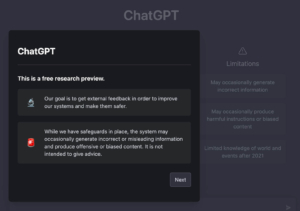
 Pros of Using AI Such as ChatGPT to Write Blog Posts:
Pros of Using AI Such as ChatGPT to Write Blog Posts: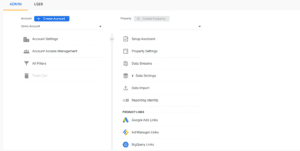
 When connecting Google Analytics to a WordPress site, you will need to access the backend of your private practice website and navigate to the Tools section of the navigation bar on the left side of your screen.
When connecting Google Analytics to a WordPress site, you will need to access the backend of your private practice website and navigate to the Tools section of the navigation bar on the left side of your screen.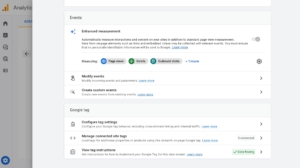 If you decide to manually add this code to your WordPress site, you will need to navigate the backend of your site once again. Once here, you need to add the copied code to the header section on each page of your site. But, WordPress doesn’t automatically allow you to edit the header code of your site. Due to this, you will likely need to install a plugin that will allow you to make these additions. Thankfully, regardless of your choice of plugin, you will often find access to your site’s header code in the Theme settings of the website builder. Please ensure you are familiar with your site and the plugin you are using if you decide to manually add the necessary code since errors in the code of your site can have a wide variety of ramifications.
If you decide to manually add this code to your WordPress site, you will need to navigate the backend of your site once again. Once here, you need to add the copied code to the header section on each page of your site. But, WordPress doesn’t automatically allow you to edit the header code of your site. Due to this, you will likely need to install a plugin that will allow you to make these additions. Thankfully, regardless of your choice of plugin, you will often find access to your site’s header code in the Theme settings of the website builder. Please ensure you are familiar with your site and the plugin you are using if you decide to manually add the necessary code since errors in the code of your site can have a wide variety of ramifications. 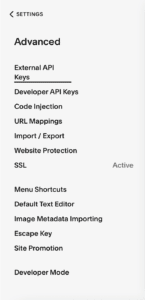 For Squarespace users, the process for connecting to Google Analytics is fairly straightforward! Once you have your measurement ID, you will need to access the back end of your private practice website. Once on your home screen, click Settings, then Advanced. Click on External API Keys from here, and paste your measurement ID in the Google Analytics section.
For Squarespace users, the process for connecting to Google Analytics is fairly straightforward! Once you have your measurement ID, you will need to access the back end of your private practice website. Once on your home screen, click Settings, then Advanced. Click on External API Keys from here, and paste your measurement ID in the Google Analytics section. 